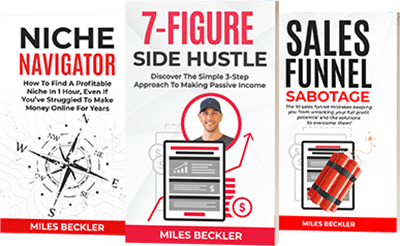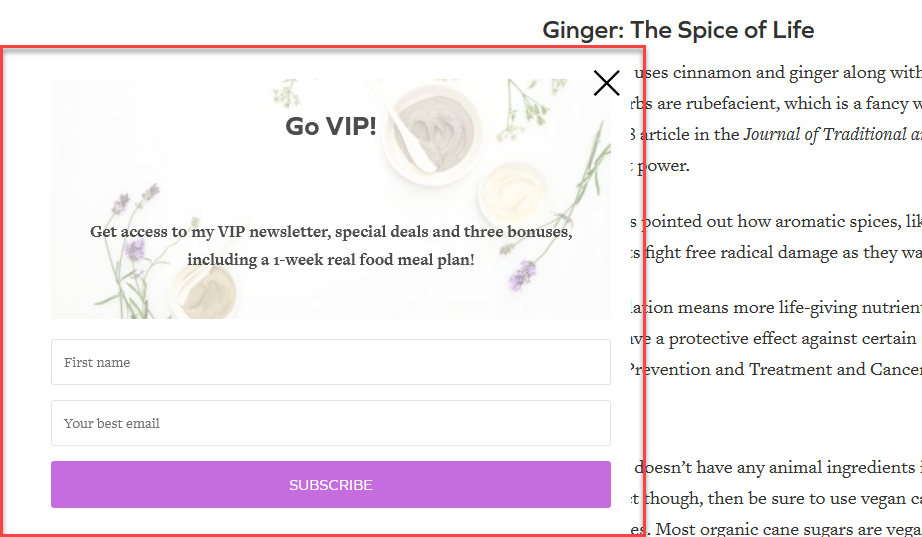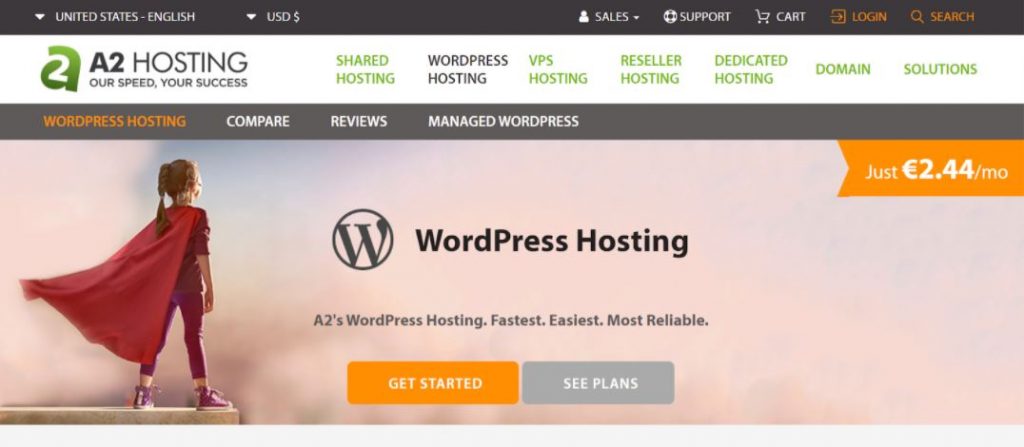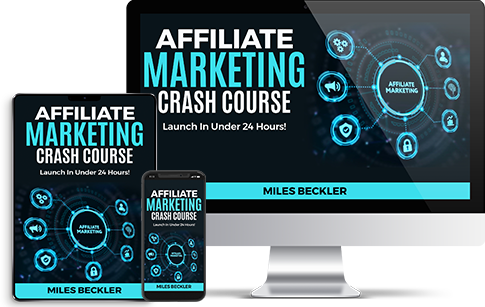Trying to figure out whether to build yourself a blog or a website?
No idea if a website or a blog is better for your business and marketing goals?
Good news ...
You're in exactly the right place to find all the answers you're looking for!
But before you jump straight in, do me a big favor...
Give yourself a huge pat on the back. After all, you've asked the perfect question to give you a competitive edge from day one on your journey towards running a successful online business.
You're probably in a hurry to start working on your dream, so let's skip past the rest of the introduction and get straight to answering your burning question!
Ready?
Blog vs. Website: Which One Should You Pick?
Before you can make an educated decision on whether to start a blog or a website, you'll need to be crystal clear about the differences between a blog and a website.
So, what is a website?
A website is a static collection of web pages that has the purpose of sharing information about a business, its products, or its services. It won't be updated often, and new content (apart from product updates) will be rare!
A great example is the website of your local bicycle shop. They have steady clientele from the local community and simply need a basic online presence to help new customers find them.
A website works ideally for their situation.
And what’s a blog, then?
A blog is a type of website where the content is king! It focuses on:
- Creating super helpful content in the form of blog posts/articles, and
- Getting as many people as possible to read and share the site!
Blogs can be a standalone online presence.
But often, people add a blog to their static website to make it more interesting and provide more support to their customers.
A great example of a blog is this website: Wellnessmama.com, a blog dedicated to providing reliable information to health-minded moms.
Now that the difference between a blog vs a website is clear, you're ready to find out ...
Which one's a better way to make money?
Generally speaking, the answer, in most cases, will be BLOGGING!
Simply put:
Blogging is the #1 best way to build an audience online, thanks to its ability to drive a large amount of traffic from Google and other search engines to your site.
Yes, you will need to learn how to write blogs for SEO and commit to being incredibly consistent over the long term, but the results will be breathtaking.
However, sometimes a website will be the better option ...
So let's take a deeper dive to explore:
When a Website Wins
There is one important exception when you should almost always build websites instead of blogs:
A website is the best choice for you if you want landing pages that ONLY need to convert traffic into leads/sales because you're getting traffic from sources external to your site.
In other words, if you already have an online presence (for instance, you have a YouTube channel with a good number of subscribers), then you don’t necessarily need to create regular content on a blog.
And YouTubing isn’t the only option out there. You could use a wide variety of tools to drive people to your site.
For example:
- Paid traffic from a social media platform (i.e., Facebook)
- Other website blogs you run
- Affiliate partners
- An email list
- A podcast channel, etc.
If you’re in this situation, awesome!
Having a website is a great strategy to make offers and land sales, because all you need are a few static pages.
(Learn how to start one of these “sales funnel websites” with a few pages in this tutorial.)
If you do not already have an online presence, you'll likely need to start a blog.
Why Do Blogs Work So Well?
First of all, what is a blog site used for?
Well, in short (and to risk sounding really cliche for just a moment), the world is your oyster once you have your own blog.
But in more specific terms, all great bloggers aim to.
- create excellent, valuable content
- Make their audience's lives much better, and
- Build an online income that lets them live precisely how they want.
A blog is the marketing channel that offers the path of least resistance to gaining awareness, trust, and ultimately converting traffic into an actionable lead and new customer.
How?
Ever seen this?
Or,
These are “optin forms” you can place in strategic locations on your blog to effortlessly entice your readers to hand you their email address in exchange for some valuable content.
In other words, with optin forms and popups, you can turn a one-time reader into a lead with a single click!
Great bloggers always win for this one simple reason:
You can offer your readers incredible value at exactly the right time for free, and they respect that!
They'll connect your name and blog website with the phrase “dependable expert.”
Ready to get started?
Then click here to learn the detailed step-by-step way to start a blog; you won't need anything else, promise!
But if you want to learn a bit more about the differences between blogs and websites, read on or watch this quick video:
Key Differences in Blogs and Websites
Differences in Traffic Acquiring
A huge difference between website and blog marketing consists of how you get eyes on your content.
A website relies on outside sources to drive traffic to the site via links and call-to-action (CTA) buttons.
These could be organic because the world already knows you're awesome, or they might be paid because you want to get results quickly.
Either way, websites aren't traffic-generation tools, but rather sales-capturing instruments.
On the other hand, blogs are the finest traffic-generation tools known to Homo Digitalis!
Should You Have a Blog on Your Website?
YES!
Building a blog website is an excellent strategy in generating more organic traffic for your website.
Starting a blog works like this:
- Add a single blog post/article to your website,
- and slowly build up as much new content as possible.
- Try to release a new post at least every week!
By having a blog and website combined in one site, you'll make sure Google sees your business as active ... and potential new customers can find you easily!
Thanks to search engines crawling the Internet's content and indexing it in search result pages, people can easily find the best article, blog post, or web page that perfectly answers their question.
Your goal is to be that leading post for a large number of search queries with a lot of traffic!
Brand/Product Validation vs. Growing a Brand
The ultimate purpose of websites and blogs is also different ...
A well-made blog is looking, more than anything, to build a brand from the ground up.
Take my site as an example.
I've dedicated years to writing helpful content in order to turn the name Miles Beckler into a synonym for “helpful marketing expert.”
Websites, on the contrary, aren't that worried about growing a brand ...
They care about brand/product validation and generating sales and income!
Call-to-Action (CTA) Button Differences
You'll also notice a major contrast in the CTA buttons on blogs and static websites.
The buttons on websites will focus on:
- “Call us” phone numbers
- “Contact us” forms (that often get spammed)
- “Book now” or “Buy/Order”
Blogs, on the other hand, because they get a load of traffic, tend to shut down “contact us” forms and numbers.
Instead, they focus on:
- “Opt-in” buttons
- “Free download” offers
- “Join my newsletter” pop-ups
- Affiliate links
As a general rule, a blog is a better option than a website because of its ability to capture traffic on a search engine and transform it into leads.
Resultantly, with a blog you can more easily reach the goal of having a recurring income stream through online monetization strategies such as affiliate marketing and online courses.
BUT ...
Before getting started, you need to be clear about one key point:
The “Tenant” vs. “Landlord” Mentality Question
What would you rather be? A tenant, or a landlord?
Seems like a trick question, right?
But when it comes to online business, it seems like loads of people want to be tenants!
If you would like to be a landlord, stay well away from using social media or a hosted blogging platform (like Wix or WordPress.com) as your site/blog's tech foundation.
If you use their platforms, then you're renting, and you're at the mercy of a large tech company!
So what's the best and most secure choice to be your own boss?
Use WordPress.org's 100% free and open-source content management system with a self-hosted site!
A2 Hosting is the best for WordPress hosting and buying your domain name — it's the only inexpensive hosting company I trust when blogging!
What Is the Difference Between a Blog and a Website on WordPress?
The “WordPress blog vs. website” question is always popping up.
And it's easy to get why ... it's confusing!
WordPress is a content management system that allows you to build both static websites and blogs (never forget that a blog is a type of website).
So, the difference between websites and blogs on WordPress is exactly the same as the difference on other platforms (like Joomla): the content!
If you see static web pages only (such as an “about us” page), then it's a WordPress website. But if you see loads of blog posts (usually listed in reverse chronological order), then you'll know it's a WordPress blog!
It might sound like extra work to create content to create a blog rather than maintain a static website, but believe me …
It's well worth it in the long run to have a blog!
Concluding Thoughts on the Blog vs. Website Choice
Okay, now you're ready...
You have the information you need, so don't waste more time contemplating the difference between blogs and websites.
Just:
- Pick the right option for your needs
- Make it using WordPress (the .org version)
- Create incredible content
- Change people's lives
- Start making an income online!
And that's all you need to know ... for now! 🤓
Once you're up and running, you'll have way more questions ... but don’t worry! You can always come back to keep learning.





